 |
International Affairs
Beatification of Castro’s Internationalism?
Armando F. Valladares
The speech of Benedict XVI receiving the letters of credential of the new ambassador to Communist Cuba on December 10, 2009, was released to the press with almost no commentary made on it.
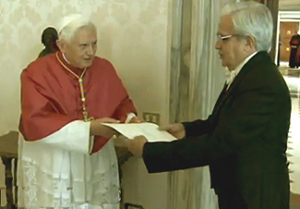
Benedict receives Eduardo Delgado and praises the Communist island-prison
|
Notwithstanding, this speech deserves the greatest attention because it shows a facet that has hardly been emphasized until now in the pontificate of Benedict XVI, considered by many as conservative. It reaffirms the incomprehensible policy of collaboration that Vatican diplomacy adopted with the Cuban regime soon after its bloody Revolution. Such diplomacy is strongly verified by this speech.
The words of the Pontiff can have serious consequences, not only for the future of Communist Cuba but for that of Latin America, to the measure that it favors in one way or another the “axis of evil” – constituted by the Communist governments of Hugo Chavez in Venezuela, Evo Morales in Bolivia, Rafael Correa in Ecuador, Daniel Ortega in Nicaragua, and others.
Praising Cuba’s revolutionary leadership
After referring deferentially to the dictator Raul Castro, the Holy Father recognizes the “decisive leadership” supposedly displayed by Communist Cuba in the “political context” of Latin America. The text goes on to praise the Cuban regime for “continuing to offer its collaboration to numerous countries” with an action that would favor and encourage “international cooperation and solidarity.” The Pontiff seems to interpret this international cooperation and solidarity as disinterested, loyal and sincere to the point of serving no interest other than offering “aid to needy peoples.”
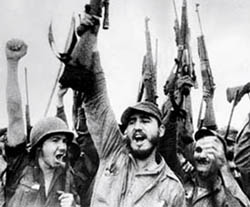
Castro's leadership praised by Benedict XVI |
However, with the greatest respect due to papal benevolence, the alleged Cuban disinterest flagrantly contradicts the definition of “internationalism” included in the country's Constitution. That document shows the regime’s intent certainly is not disinterested and cannot be reduced to “aid the needy peoples.”
Indeed, already in its Preamble, the Cuban Constitution makes its intrinsically harmful intent clear when it defines “proletarian internationalism” as the model for the numerous “heroic” revolutionary movements it has encouraged in so many countries of Latin America and Africa. In reality, as is known, such movements were and continue to be synonymous with bloody revolutions that cause greater misery for the needy people.
To leave no doubt about its aims, article 12 of that communist Constitution endorses and assumes as “its own” the “internationalist principles” extolled in its Preamble, clearly stating that they are inseparable from the “anti-imperialist principles” (n. 2), i.e., revolutionary principles. The same article goes so far not only to justify the “legitimacy” of “armed resistance” (n. 4), but also to offer solidarity to these revolutionary movements as an “internationalist duty.” This task has been fulfilled to the letter in the cruelest manner possible by Communist Cuba.
Praising education and health care

An education to form new generations of Communists |
One might try to justify Benedict XVI’s speech by affirming that it is referring specifically to the two “vital fields” of “education and health care.” In reality, this would hardly constitute a justification but rather an aggravating circumstance. As numerous scholarly studies have demonstrated and as the Cuban Constitution itself recognizes, education and health – those often praised “successes” of Cuban Communism - have been satanic pliers used for the psychological, mental and social control of youth and adults during the five long decades of the Castro Revolution.
For this reason, to internationalize these psychological pliers - as the regimes in Venezuela, Bolivia, Ecuador, Nicaragua and other countries of the Latin American of the “axis of evil” are doing - is extremely serious.
Should there be any doubt about this, article 39 of the Cuban Constitution dispels it. It states that the Communist State “foments and promotes education” exclusively in function of the “Marxist ideal,” with the implacable objective of “promoting” the “Communist formation of the new generations” (nn. 1, 3). In reality, it is not a formation, but a supreme spiritual and moral deformation.
What, then, is the essence of this Cuban “leadership” to which Benedict XVI refers? Peace, well-being and Christian prosperity? Or chaos, subversion and many other forms of anti-Catholic revolutionary actions inspired and promoted by Cuba? How can one understand the papal emphasis of this “leadership” in an explicit context of eulogy? Perhaps one would call it the “beatification” of Cuban internationalism.
Avoiding the real causes of Cuba’s economic failure
But the woeful surprises in the papal speech do not stop there.
Continuing, the Pontiff seemed to attenuate the true cause of the extreme misery of Communist Cuba, attributing it to the “grave international crisis” that produces “devastating effects,” to “natural disasters” and to the American “economic embargo.” He omits the most profound cause of Cuban misery, which is an economic system that applies an implacable internal embargo against its people through the abolition of private property and the stifling of free initiative.
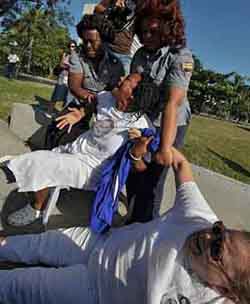
White Ladies, relatives of prisoners, are humiliated by the police |
Regarding the “concrete signs” of “openness to the exercise of religious freedom” that the Pope highlights as favorable for Cuban Catholics, I recall the nefarious article 62 of the Constitution, which is an implacable juridical-penal tourniquet against all “freedoms,” including and principally “religious freedom,” which it cynically offers to the unhappy inhabitants of the island-prison.
This article of the Constitution quite literally is a threat: “None of the freedoms recognized for citizens” can be exercised “contrary to the existence and objectives of the Socialist State, or contrary to the decision of the Cuban people to build Socialism and Communism.” It ends by warning that “violations of this principle are punishable by law.”
In Cuba, there has never been much distance between the word and the deed. Punishment has become the reality for hundreds and thousands of opponents, who have been assassinated on the infamous paredón [wall] or have passed through the prisons of the regime. Likewise for so many other political prisoners who remain in them; for the White Ladies, the mothers, spouses and sisters of political prisoners who are humiliated and beaten in the streets of La Havana, and recently for young bloggers on the island.
Contradictory analyses: one as Cardinal and another as Pope
On August 6, 1984, the Prefect of the Congregation for the Doctrine of the Faith , then Card. Joseph Ratzinger, in his Instruction on ‘Liberation Theology,’ clearly and categorically diagnosed what applies to the Cuban reality today:
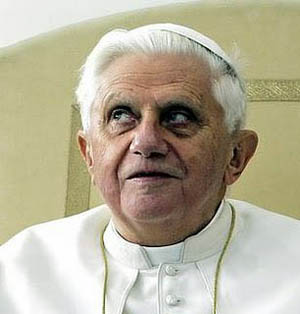
How to reconcile his contradictory statements? |
“Millions of our contemporaries legitimately aspire to regain fundamental freedom of which they have been deprived by totalitarian and atheistic regimes that have come to power by revolutionary and violent roads, precisely in the name of the liberation of the people. One cannot ignore this shame of our times: Pretending to bring freedom, whole nations are delivered to condition of slavery unworthy of man.”
The future Pope concluded in a spine-chilling manner: “All those who become accomplices in such slavery, even if unconsciously, betray the people whom they intend to serve.”
Today, 26 years after having signed that brilliant analysis, the question that rises is if Communist Cuba, in the mind of the present-day Pontiff, continues to be a “shame of our times.” If Cuba continues to be so, how can one understand the statements above from the recent papal speech to the new Cuban ambassador? If, on the contrary, Communist Cuba has ceased to be a “shame of our times,” what are the reasons for this 180-degree turn regarding the intrinsic aspects of that regime?
Other no less important aspects of the papal speech could be discussed, which lamentably are no less dolorous. Those comments can be made on another opportunity, should circumstances require it.
Recalling previous betrayals…
Finally, I register the shudder I felt at the mention of the “never interrupted” relations between the Holy See and the Cuban regime. Passing in my mind, as in a tragic film, are episodes of decades of political strain between the Vatican and Communist Cuba, with the pilgrimages of so many high Prelates, Cardinals and secretaries of State - including the present one – and their many searing eulogies of the tyrant Fidel Castro and the supposed “successes” of the regime. I also see so many other episodes of Communist-Catholic collaboration, headed by the present Cardinal Jaime Ortega y Alamino of Havana.
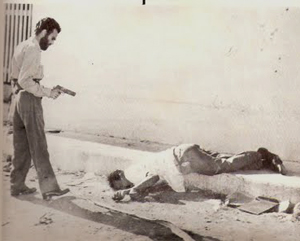
For the opponents, El Paredon |
Also, recalling that period of “never interrupted” relations, my ears resonate – as if it were today - with the shouts of young Catholic martyrs, shot on the paredón of the sinister prison of La Cabana, who died proclaiming “Viva Cristo Rey! Down with Communism!”
And I recall the episode of the three young García Marín brothers who, in December of 1980, sought asylum in the Nunciature of La Habana. They were later taken from there with promises of liberty and personal security by persons wearing ecclesiastical clothing and driving an automobile of the Nunciature. In reality, they were not clergy but agents of the Cuban police who deceived them and took them away to be savagely tortured and finally executed. In my Memoires, I narrated that episode which, until today, has never been denied (cf. A. Valladares, Against All Hope, chap. 48).
In previous articles I have criticized the policy of collaboration of the Vatican with the Cuban regime, and I reiterate it with special emphasis here in this respectful and anguished analysis. As a Catholic, a Cuban and an ex-political prisoner it pains me enormously to make this type of public consideration, undertaken as an unavoidable duty of conscience, with the veneration due to the Chair of Peter. It causes me a suffering perhaps greater than the worst physical tortures that I suffered for 22 years in the Cuban prisons, because spiritual suffering is more profound than physical pain.

Posted January 13, 2010
Armando Valladares, a former Cuban political prisoner,
was U.S. Ambassador to the U.N. Commission on Human Rights in Geneva
during the Reagan and Bush administrations.
Contact him at:
Armandovalladares2005@yahoo.es

Related Topics of Interest
 Benedict's Red Advent Benedict's Red Advent
 Benedict XVI and Bertone’s Trip to Cuba Benedict XVI and Bertone’s Trip to Cuba
 Ignoring the Evil of Communism in Cuba Ignoring the Evil of Communism in Cuba
 In Cuba Card. Bertone Attacks American Embargo In Cuba Card. Bertone Attacks American Embargo
 Bertone and the Castro's Fraudulent Religious Policy Bertone and the Castro's Fraudulent Religious Policy
 'Cuba's Communist Revolution Is a Sign of the Kingdom of God' 'Cuba's Communist Revolution Is a Sign of the Kingdom of God'
 The Cuban Fiasco The Cuban Fiasco
 Declaration of Resistance to the Vatican Ostpolitik Declaration of Resistance to the Vatican Ostpolitik

Related Works of Interest
|
|
International Affairs | Hot Topics | Home | Books | CDs | Search | Contact Us | Donate

© 2002- Tradition in Action, Inc. All Rights
Reserved
|
 |
|